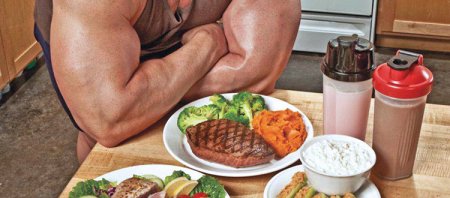Vitamins for muscle growth
Vitamin A
The main function of vitamin A, which is important for the athletes, it is directly involved in protein synthesis. This process occurs in the formation of new muscle cells and, consequently, the capacity of the muscles. In addition, due to vitamin A greatly accelerated the process of glycogen, which is the source of energy used by the body during intense exercise. When you exercise, vitamin A should be consumed regularly and in large amounts, as during physical activity significantly deteriorating its assimilation by the body, due to which a large amount of this vitamin is derived from it prematurely, and it does not have a proper impact. Sources of vitamin A, there is quite a lot, but the main and the most easily accessible of them - it's milk, eggs, carrots, tomatoes, apricots, pumpkin, fish, melons, peppers, spinach, parsley, dill and lettuce.
Vitamin C
The list of useful vitamins for muscles of vitamin C is given a special place because it has a multifaceted effect on the body and is directly involved in the process of muscle building. It occurs due to vitamin C uptake by the body falling into a protein that acts as the main material for building muscle tissue. In addition, vitamin C promotes collagen formation, strengthens connective tissue and joints reducing suffering during heavy loads on the muscles. When a sufficient amount of vitamin C production process normalized natural steroid hormones, such as testosterone.
To complete the work of muscles, it requires oxygen, which is conveyed to them along with the blood. Vitamin C accelerates the process of transportation, therefore, helps the muscles in a timely manner and in sufficient quantity is enriched with oxygen. Not to mention the fact that vitamin C acts as a powerful antioxidant, which protects not only the immune system, but also the muscles from the effects of free radicals, destructive and debilitating muscle tissue. Note that vitamin C is able to be synthesized by the body, so it is necessary to monitor the dosage. Natural sources of vitamin C include all citrus fruits, berries, kiwi, cabbage, peppers, spinach, broccoli, radishes and onions.
Vitamin D
The main function of vitamin D during the growth of muscle - a normalization of assimilation of phosphorus and calcium which occurs due to muscle contraction. It depends on the intensity of contractions duration of strength training is the main way to build muscle.
Thus, the lack of vitamin D in the body slows down the growth of muscle mass. In addition, calcium is the main material, strengthens bone tissue, muscle retention, weight and volume of which increases with intense physical activity. So, to prevent injury and maintain grown muscle tissue, the body needs sufficient amounts of calcium assimilation which takes place much more effective in combination with vitamin D. For the vitamin D you need to eat fish, preferably fatty varieties, cod liver oil, liver, eggs and mushrooms . In addition, under the influence of sunlight on the skin, the body is able to synthesize vitamin D, so it is recommended more often to be outdoors, especially on sunny days.
Vitamin E
If you decide to engage in weight training and accelerated pace to build muscle, you can not do without vitamin E. It regulates muscle activity, relieves fatigue and acts as a regulator of protein metabolism in the body. Thus, using vitamin E in sufficient amounts, it is possible to avoid the shortage of protein required to repair damaged during loading of muscle tissue. Another important function of vitamin E - is the protection of cell membranes, destroyed during intense workouts and have a direct impact on the course of metabolic processes in the body, including the growth of muscle cells. On how quickly and intensely will recover the cell membrane will depend on the rate of increase in muscle mass and muscle growth. The most common sources of vitamin E are vegetable oils, namely sunflower, olive, corn, soybean and flaxseed, nuts, such as peanuts, almonds, wheat germ, oatmeal, avocado and green leafy vegetables.
B vitamins
In preparing the diet, special attention should be given vitamin B, which provide the body extremely positive impact and participate in almost all occurring processes within it, including in the process of muscle growth. B vitamins act as a key element in the digestion of proteins and building new muscle tissue, are responsible for transporting oxygen to the working muscles, are involved in energy production, increase muscle excitability, promote the absorption of carbohydrates and amino acids, normalize the fat, protein and carbohydrate metabolism, as well as accelerate the intensity of muscle contraction during exercise and help in building muscles. Get the B vitamins can of meat, fish, seafood, milk and dairy products, nuts, wheat, berries, fruits and vegetables.
